This post has been written for the benefit of Temples, Academics and other content providers in the Shin Buddhist world.
It has been, and remains, a pleasure and privilege to help build online resources for the world wide Sangha.
This website, jodoshinshu.faith, started hosting various Jōdo Shinshū (Shin Buddhist) in November 2020. A time when many temples had to close their doors, services started being conducted live online and many groups and activities had to sadly be cancelled for public health reasons.
Such a period of time as this highlights Buddha’s teaching of impermanence.
There are causes for all human suffering, and there is a way by which they may be ended, because everything in the world is the result of a vast concurrence of causes and conditions, and everything disappears as these causes and conditions change and pass away…
The Teaching of Buddha (BDK) – Dharma – Chapter 1.II – Causation
…. It is the everlasting and unchanging rule of this
world that everything is created by a series of causes and
conditions and everything disappears by the same rule;
everything changes, nothing remains constant.
人びとの苦しみには原因があり、人びとのさとりには道があるように、すべてのものは、みな縁(条件)によって生まれ、縁によって滅びる。..
仏 教 聖 典 – 第一章 因縁- 第二節 不思議なつながり (BDK)
.. すべてのものが、縁によって生じ、縁によって滅びるのは永遠不変の道理である。だから、うつり変わり、常にとどまらないということは、天地の間に動くことのないまことの道理であり、これだけは永久に変わらない。
(quote source: The Teaching of Buddha by BDK – https://bdkamerica.org/find-your-edition/)
What better job can there be than to curate and share Dharma resources?
And what better time than now?
There are many wonderful resources in the cyber space for sharing the Dharma. However, over time, many of these hosted and linked-to resources suffer from an entirely avoidable terminal failure; broken links to source material.
While everything does indeed come to an end, there are a few things we can do to ensure that the Dharma messages and resources we share remain available for as long as possible in order to reach as many people as possible. Many authors publish books with links to extremely useful content and, sadly, so many of those website links are now pointing to 404 error pages or non existent domains.
Allow me to highlight the problem with some examples and suggest a few solutions for your consideration.
Anyone can build a website these days, however there are a lot of small considerations many site owners may not be aware of when updating or moving a resource to a new generation of web interface or onto a new domain name.
Highlighting these issues does not, in any way, reflect negatively on the content providers as the subject of link management is a fairly niche topic and the job of managing redirects can be fraught with complexity. Further, it is absolutely the responsibility of the individual who uses a site to update any links to said site should they change. Not the site itself. That being said, it is quite important to keep links updated and I aim to explain why and how in this article.
The author of this article is also guilty of failing to create redirects (on several occasions) and has learnt the hard way. So it is the intention of this article to highlight this issues and discuss ways to both prevent and resolve them. So you don’t need to make the same mistakes and inadvertently devalue other resources or create extra work for others in the future.
Example: Rev. Dr. Al Bloom, a Shin Buddhist role model to this bonbu webmaster and many others in our tradition, created Shin Dharma Net with BSC Hawaii before his passing. I think I first came to know about this resource in the summer of 2016 and have linked to and referenced it many times since. Please visit the Shin Dharma Net resource here: http://bschawaii.org/shindharmanet/
This resource remains invaluable and is still rightfully keeping pride of place on the BSC’s home page: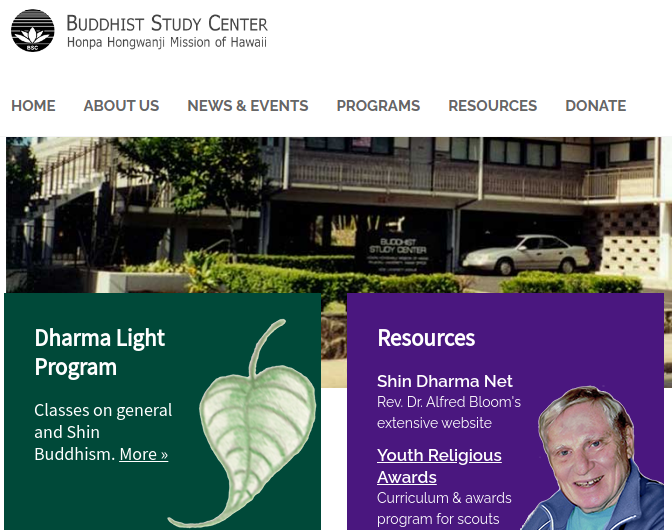
Sadly, a number of links on his site are now either broken or pointing to non-existent domains.
On this page Documents & Sutras, 60% of the links to referenced resources are now broken. 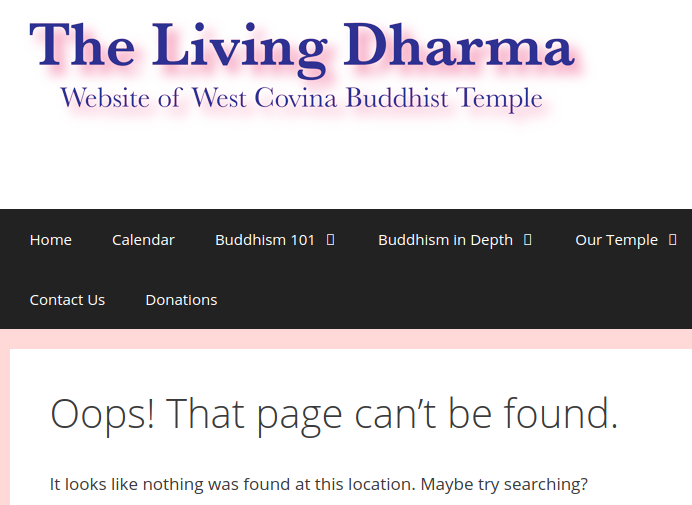
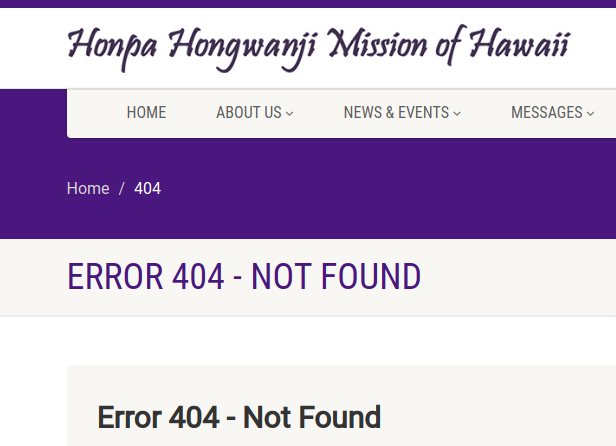
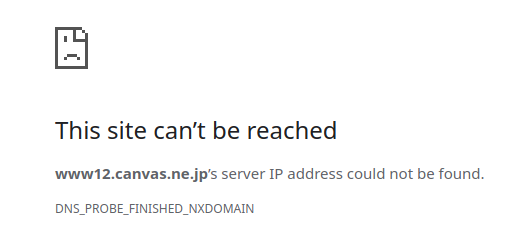
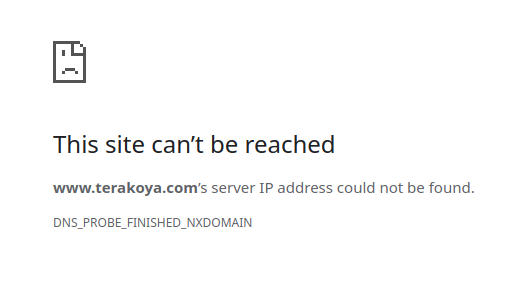
The broken link issue on Rev. Bloom’s Shin Dharma Net is not limited to the above page. However, this page offers a good example of the problems associated with creating a ‘web resource’ that links to other resources as we have to put our faith in the source material remaining indexed.
So, how do we mitigate this broken link problem going forward?
The first and foremost important thing to do is to remember to ask about link management provision when you start the process of redesigning your web resources.
Web technology changes extremely quickly. And we all need to keep up with changes. One of the contributing factors in the recent changes in websites is that we engage differently now.
Click here has become tap here. We’ve shifted to mobile faster than anyone could have expected. Websites that are not mobile friendly will soon disappear from search engine listings and engagement will drop.
So it’s not at all surprising that there has been a bit of a ‘rush’ to upgrade websites to work with modern (current) technology.
If you host a new or updated website that has broken your old links, you can resolve this by hiring a web developer or system administrator to map your old sitemap with your current website content. In nerd talk that’s called creating 301 redirects. If you have the technical skill this can be accomplished fairly easily by yourself, however, is quite a dull and laborious chore! You can inexpensively outsource this work (I do).
Aside from the problems as highlighted in the examples above, your website’s search engine ranking (viability to new visitors) will be seriously impacted as the old, referenced links, will no longer work and it takes a long time to re-index and rank new site content.
Read this short article from Google on how to solve this problem: https://developers.google.com/search/docs/advanced/crawling/301-redirects?hl=en&visit_id=637412057797048812-1560839832&rd=1
If you are unsure where to start in looking into this. Please feel free to reach out to this bonbu webmaster using the contact form below for further dialogue and advice (this is a free service for the Shin Buddhist Sangha).
Consider amending your Copyright policies
Copyright can be problematic and often stifles the ability for your work to be of benefit to a wider community. Especially in regards to the sharing of the Dharma.
If content creators (authors, translators & producers) were to make it known that non-commercial sharing in the original format (without adaption or remixing) is allowed with correct attribution, a lot of the content could then be hosted on other sites and the issue of the ‘broken link time-bomb’ would abate. Especially for religious and academic resources.
It is indeed important to credit authors, to reference the source and offer links (that hopefully will continue to work for many years to come) to central resources. However it is equally important to put your publications to work. To allow more people, though all formats, to hear the Dharma.
This is an example of the old-style, and extremely common, copyright terms:
ALL RIGHTS RESERVED NO PART OF THIS PUBLICATION IN ANY FORM MAY BE REPRODUCED STORED IN RETRIEVAL SYSTEM OR TRANSCRIBED BY ANY MEANS BE THAT ELECTRONIC MECHANICAL PHOTOCOPYING RECORDING OR OTHERWISE WITHOUT THE EXPLICIT PRIOR WRITTEN PERMISSION OF THE PUBLISHER
Common copyright terms seen on publications
And below you can see a modern, less restrictive, example from Creative Commons: 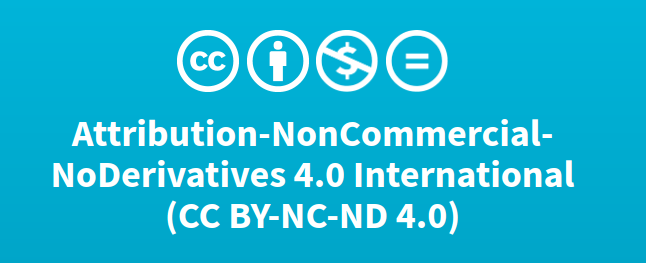
This means the following:
You are free to:
- Share — copy and redistribute the material in any medium or format
Under the following terms:
- Attribution — You must give appropriate credit, provide a link to the license, and indicate if changes were made. You may do so in any reasonable manner, but not in any way that suggests the licensor endorses you or your use.
- NonCommercial — You may not use the material for commercial purposes.
- NoDerivatives — If you remix, transform, or build upon the material, you may not distribute the modified material.
Learn more about Creative Commons here: https://creativecommons.org/choose/
There are further advantages to allowing your work to be hosted on 3rd party websites for the purpose of sharing the Dharma. Inbound links to the original content (source material – sites) brings awareness to the other resources you or your organization may have available.
Inbound links to your websites also help in improving your overall search engine ranking which means more visibility and a better chance your efforts in this life make a difference in the lives of others.
Hearing, Sharing and living the Dharma should ideally be our primary objective in the limited time we have before we board the ship to the Land of Bliss. While we take nothing with us, we can leave behind some solid foundations for future generations to build upon.
There are four truths in this world: first, all living beings rise from ignorance; second, all objects of desire are impermanent, uncertain and suffering; third, all existing things are also impermanent, uncertain and suffering; fourth, there is nothing that can be called an “ego,” and there is no such thing as “mine” in all the world.
The Teaching of Buddha (BDK) Dharma – Chapter 2.I – IMPERMANENCY AND EGOLESSNESS
また、この世に四つの真実がある。第一に、すべて生きとし生けるものは、みな無明から生まれること。第二には、すべて欲望の対象となるものは、無常であり、苦しみであり、うつり変わるものであること。第三に、すべて存在するものは、無常であり、苦しみであり、うつり変わるものであること。第四に、我も、我がものもないというとである。
仏 教 聖 典 – 第二章 人の心とありのままの姿
第一節 変わりゆくものには実体がない (BDK)
(quote source: The Teaching of Buddha by BDK – https://bdkamerica.org/find-your-edition/)
If any temples or Dharma centers would like to discuss the issues of broken links, or want to learn more about how to solve current broken-link problems or indeed avoid future issues; please feel welcome to reach out using the below form.
The bonbu webmaster of this site has no commercial interests and will always offer support at no cost or expectation of reward or recognition.
Thank you for reading.
Gassho..
